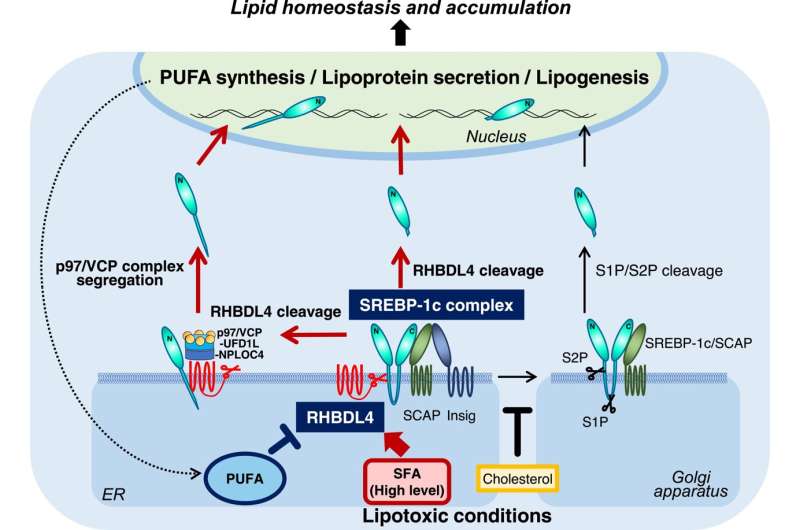A novel pathway regulating lipid biosynthesis by fatty acids

Researchers have been studying the transcription factor, SREBP, a critical regulator of lipid biosynthesis. Precursor SREBP proteins, located in the endoplasmic reticulum (ER) of the cell, are transported through the Golgi apparatus to the nucleus. Here, they promote the transcription of genes associated with lipid biosynthesis, playing a pivotal role in regulating cholesterol.
The paper is in the journal PNAS Nexus.
SREBP-1c, a specific member of the SREBP family, is known to activate fatty acid synthesis. Interestingly, this process is inhibited by polyunsaturated fatty acids. The exact mechanism behind this regulation, however, remains to be elucidated.
The research team elucidated a novel cleavage mechanism of SREBP-1c, a protein involved in fatty acid synthesis, and confirmed its regulation by fatty acids. The cleavage of SREBP-1c occurs in the endoplasmic reticulum, with the rhomboid protease RHBDL4, located in the ER membrane, identified as a new cleavage enzyme for SREBP-1c. This cleavage process is activated by saturated fatty acids and deactivated by polyunsaturated fatty acids, suggesting that RHBDL4's activity is modulated by the type of fatty acid.
Additionally, the team discovered a unique mechanism where the VCP complex extracts the cleaved SREBP-1c protein from the endoplasmic reticulum.
In the livers of mice deficient in the RHBDL4 gene and fed a high-fat and high-cholesterol diet, the activation of SREBP-1c cleavage was suppressed. This inhibited the expression of a group of target genes involved in fatty acid synthesis, polyunsaturated fatty acid synthesis and uptake, and lipoprotein secretion, which improved fatty liver pathophysiology, as observed in wild-type mice.
The RHBDL4-SREBP-1c pathway, uncovered in this study, represents a lipid homeostasis mechanism regulated by fatty acids. This groundbreaking discovery is anticipated to pave the way for developing new therapeutic strategies for metabolic disorders and lifestyle-related diseases stemming from abnormal lipid metabolism.
More information: Song-Iee Han et al, Rhomboid protease RHBDL4/RHBDD1 cleaves SREBP-1c at endoplasmic reticulum monitoring and regulating fatty acids, PNAS Nexus (2023).
Journal information: PNAS Nexus
Provided by University of Tsukuba















